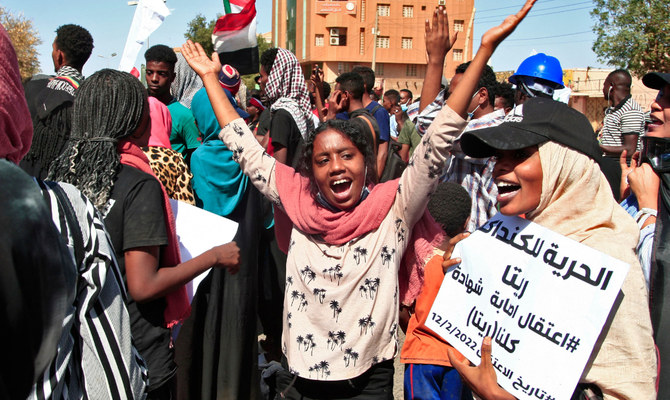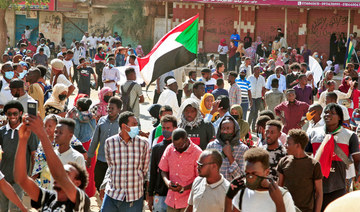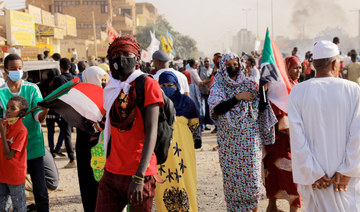KHARTOUM: More than 100 Sudanese detainees, including high-profile politicians, began a hunger strike on Tuesday, allied lawyers and doctors said.
The detainees are part of the protest movement against an Oct. 25 army coup that ended a civilian-military power-sharing arrangement that followed the overthrow of long-ruling autocrat President Omar Bashir in 2019.
The coup prompted mass protests during which 81 people have been killed, most recently two on Monday, and more than 2,000 injured, according to the Central Committee of Sudanese Doctors.
“More than 100 unlawful detainees in Soba prison entered today in an open hunger strike due to their unjustified and illegal detention,” the Defense Committee for the Unlawfully Detained and Martyrs of Arbitrary Killings said in a statement.
The group said separately that one suspect in the killing of a police brigadier general had been tortured while another was in solitary confinement.
Civilian politicians Khalid Omer Yousif and Wagdi Salih were taking part in the hunger strike, said Abdelqayom Awad, a member of Yousif’s Sudanese Congress Party.
Along with former Sovereign Council member Mohamed Al-Faki Suleiman who was arrested on Sunday, the men face corruption charges apparently stemming from their work on a taskforce dismantling the network of Bashir.
The Sovereign Council was a body of civilian politicians and military men set up after Bashir’s overthrow to lead a transition to democracy.
It was dissolved after the October coup, setting back those plans.
Military leaders say the coup was necessary due to political infighting and for the country’s security, but they say they are still committed to elections in mid-2023.
Military leader Gen. Abdel Fattah Al-Burhan said in an interview on Saturday he was not involved in the arrests of Yousif and Salih — who were also detained temporarily in the coup — but that their work on the committee had diverged from its aims.
On Monday, thousands rallied in the capital Khartoum and its twin city of Omdurman, while protests also took place in the eastern city of Port Sudan and in the western Darfur region, according to witnesses.
In Khartoum, protests had begun with crowds waving national flags and carrying red balloons, as the rallies coincided with Valentine’s Day.
“Today is the nation’s love day,” one banner read.
Some shouted slogans demanding the authorities release activists who had been arrested, while others carried pictures of protesters killed.
“We are demanding the release of resistance committee members and politicians who were unjustly arrested, and some of whom are facing fabricated charges,” protester Khaled Mohamed said.
But as crowds tried to approach the presidential palace, security forces fired volleys of tear gas canisters.
One protester was killed after he was shot in “the neck and chest by live rounds by coup forces” in Khartoum, the independent Central Committee of Sudan Doctors said.
Another protester was later killed in Omdurman after being struck by “live bullets to the left shoulder which penetrated the chest,” the committee said.
Sudanese police said in a statement that at least 102 police were “severely wounded” while one suffered “a gunshot to the foot.”
It also noted that protesters have “smashed the front” of the parliament building, set a fire near an adjacent gas station, and damaged several vehicles and a mosque in Omdurman.
Damage was also reported to several parts of the Ministry of Youth and Sports in the city, and items belonging to security guards were looted, it said, adding that police only “exercised the reasonable legitimate force” in response.
The authorities have also arrested scores of activists accused of belonging to the “resistance committees” that have been instrumental in organizing protests.
“The number of people detained arbitrarily and without criminal charges has exceeded 100,” the Sudanese Professionals Association said Monday.
On Sunday, authorities arrested Mohamed Al-Fekki, a civilian former member of the ruling Sovereign Council, which led the country under the now stalled 2019 power-sharing agreement.
Last week, authorities arrested ex-minister Khaled Omar Youssef and Wagdi Saleh, the spokesman of Sudan’s main civilian bloc, the Forces for Freedom and Change.
Those arrests came just a day after they joined an FFC delegation for talks with UN special representative Volker Perthes, as part of efforts to resolve Sudan’s deepening crisis.
The October military power grab, the latest coup in Sudan since its independence, has sparked widespread international condemnation and punitive measures — but authorities have shown little inclination to compromise.


























